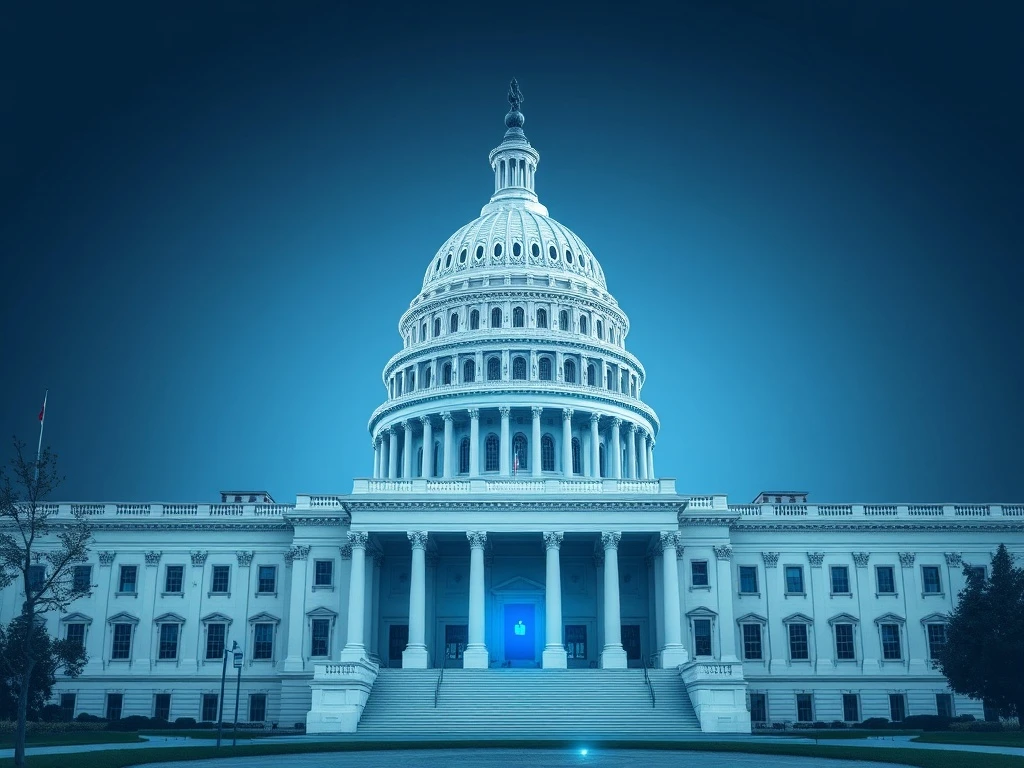Crucial Crypto Market Structure Bill Nears Breakthrough, Says Coinbase CEO

The United States crypto industry watches closely as legislative efforts advance. A significant development is currently underway in Washington. Coinbase CEO Brian Armstrong recently shared an optimistic update. He indicated that a comprehensive Crypto Market Structure Bill is nearing completion in the US Senate. This news arrives despite a prevailing government shutdown, highlighting the urgency and focus on digital asset legislation.
Optimism Surrounds US Crypto Market Structure Bill Progress
Coinbase CEO Brian Armstrong expressed strong confidence in recent legislative progress. He posted a video on X, detailing significant movement in the Senate. According to Armstrong, US senators are actively working to pass crucial market structure legislation for crypto. This effort continues even amid the government shutdown. Armstrong believes the bill could advance by Thanksgiving, suggesting widespread agreement.
He noted that roughly 90% of the legislative framework has already found common ground. This consensus marks a substantial step forward. Lawmakers from both sides of the aisle are reportedly finding more areas of agreement than disagreement. This bipartisan effort underscores the growing recognition of crypto’s importance. It also reflects a desire to establish clear rules for the industry.
Navigating DeFi Innovation and Regulatory Challenges
While much of the bill is settled, a critical 10% remains. These unresolved issues primarily center on decentralized finance, or DeFi Innovation. Policymakers face the complex task of regulating this rapidly evolving sector. They aim to protect innovation within DeFi while ensuring consumer safety. Armstrong emphasized this delicate balance.
Lawmakers are carefully considering how to approach DeFi. They want to avoid stifling its growth. Armstrong highlighted a key distinction. He stated that centralized intermediaries, like Coinbase, should be regulated. Conversely, the underlying protocols should not. This approach seeks to foster an environment where new technologies can flourish. At the same time, it ensures responsible oversight for key players.
The Pivotal Role of Stablecoin Regulation
A significant component of the ongoing legislative discussion involves Stablecoin Regulation. Armstrong underscored the importance of preserving stablecoin rewards. This issue gained prominence following the passage of the GENIUS Act earlier this year. The GENIUS Act established federal standards for stablecoin reserves. It also mandated transparency and consumer protections. This act marked a pivotal moment for digital asset oversight.
Stablecoins play a crucial role in the crypto ecosystem. They bridge traditional finance and digital assets. Their stability makes them essential for trading and payments. Therefore, clear regulatory frameworks are vital. These frameworks protect users and ensure market integrity. Armstrong’s comments highlight the industry’s commitment to maintaining stablecoin utility.
Banking Lobby’s Stance on Stablecoin Regulation and the GENIUS Act
The banking industry has voiced strong opposition to certain aspects of the GENIUS Act. Their primary concern revolves around what they perceive as a loophole. This loophole potentially allows interest payments on stablecoins. The GENIUS Act explicitly prohibits stablecoin issuers from offering interest or yield. However, this restriction does not extend to exchanges. The Bank Policy Institute (BPI) highlighted this discrepancy.
The BPI argued that excluding crypto exchanges like Coinbase could undermine the act. They stated that requirements could be easily evaded. This would occur if interest payments were allowed indirectly to stablecoin holders. Banking lobbies are increasingly concerned. They fear stablecoins could threaten their traditional business model. Currently, banks offer depositors minimal interest rates. Industry insider Austin Campbell, a New York University professor, noted this growing anxiety. He observed that bankers are ‘panicking’ over the prospect of stablecoin holders earning yields. This competitive pressure drives much of the banking industry’s pushback.
Coinbase CEO Brian Armstrong’s Vision for Crypto Legislation
Coinbase CEO Brian Armstrong remains a vocal advocate for clear crypto regulation. His recent statements reflect a strategic vision. He believes that appropriate legislation can foster growth. It can also protect consumers. Armstrong’s firm stance against banking lobby efforts is clear. He stated, ‘We’re not going to let them re-litigate that.’ This refers to attempts to block stablecoin rewards. His commitment to preserving innovation while embracing regulation defines his approach.
Armstrong’s perspective emphasizes a future where crypto operates within defined legal boundaries. This clarity would benefit both businesses and users. It would reduce uncertainty and encourage mainstream adoption. Coinbase, as a major centralized intermediary, understands the need for regulation. Yet, it champions a framework that supports the broader decentralized ecosystem.
Broader Implications for the Crypto Ecosystem
The potential passage of this market structure bill carries significant implications. It could provide much-needed clarity for the entire crypto industry. Clear regulations often lead to increased institutional investment. They also foster greater consumer trust. This legislative progress could solidify the United States’ position. It could become a leader in digital asset innovation. Conversely, stalled progress might push innovation overseas.
The debate surrounding DeFi and stablecoins highlights a fundamental tension. Regulators seek to mitigate risks. Innovators aim to build new financial systems. Achieving a balance is crucial for sustainable growth. The outcome of this bill will undoubtedly shape the future landscape of digital finance in the US.
In conclusion, the journey toward comprehensive US crypto regulation continues. Brian Armstrong’s optimism offers a glimpse into potential breakthroughs. While challenges remain, particularly around DeFi and stablecoin rewards, the bipartisan effort suggests a shared goal. Establishing clear rules for the digital asset space remains a top priority. This legislative momentum could pave the way for a more secure and innovative crypto future.








